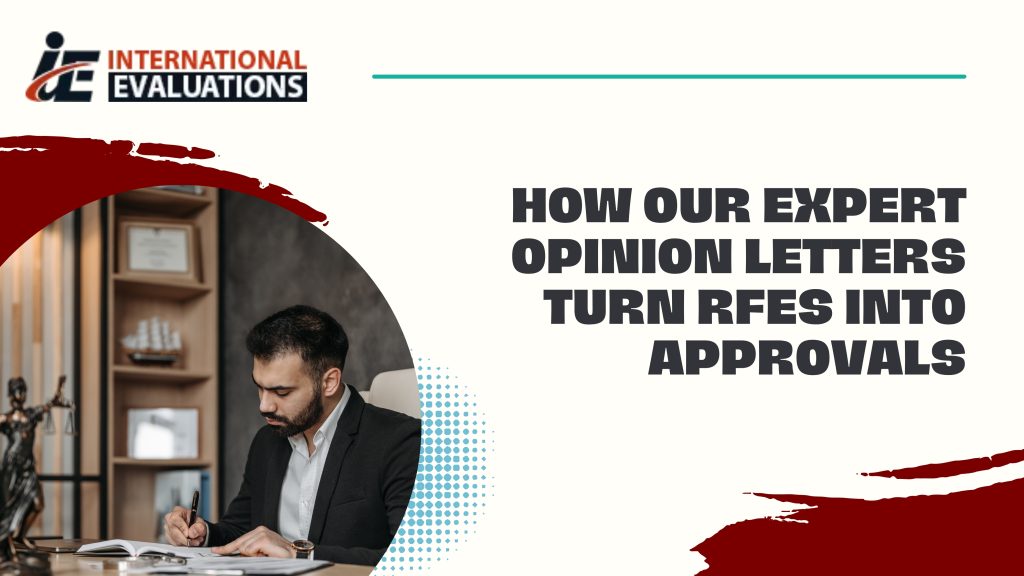Getting closer to your dream of working or living in the U.S. is an exciting journey—but even strong visa petitions can sometimes hit unexpected hurdles. One such hurdle is a Request for Evidence (RFE) from USCIS. While it may seem discouraging, it doesn’t have to mean denial. For hundreds of attorneys, employers, and foreign professionals nationwide, International Evaluations has provided the critical support needed to transform RFEs into approvals through USCIS-compliant Expert Opinion Letters.
Whether the petition is for an H-1B, EB1-A, EB2-NIW, or O-1 visa, RFEs are commonly issued when USCIS is not convinced the role qualifies as a specialty occupation or when there is insufficient evidence that the beneficiary meets the required academic and professional standards. This is where International Evaluations’ expert-backed documentation makes all the difference.
What Is an RFE—and Why Is It So Common?
A A Request for Evidence is issued when USCIS believes the initial petition lacks sufficient documentation to support its claims. In employment-based petitions, the most common RFE triggers include:
- Failure to prove the specialty occupation requirement (H-1B)
- Lack of clear evidence that the beneficiary qualifies for the position (EB, L-1B)
- Insufficient proof of extraordinary ability (O-1, EB1-A)
- Unclear job duties or education equivalence
- Inconsistent or unverified credentials
These RFEs can significantly delay or even derail a visa process, especially when timelines are tight or filing deadlines are near.
Where Our Expert Opinion Letters Make the Difference
At At International Evaluations, we specialize in providing tailored, USCIS-compliant Expert Opinion Letters that address these very challenges head-on.
Unlike generic or template-based letters, our evaluations are prepared by industry-specific professors and experts with deep knowledge of your field—whether it’s IT, engineering, finance, healthcare, or the arts. These experts evaluate the position, the beneficiary’s qualifications, and the standards of the profession, and then draft a letter that meets the exact requirements USCIS is looking for.
Here’s how we help turn RFEs into approvals:
1. Addressing the Specialty Occupation Criteria
Many H-1B RFEs cite a failure to prove that the job is a specialty occupation—meaning the role requires a theoretical and practical application of specialized knowledge and at least a bachelor’s degree or equivalent in a specific field.
Our Specialty Occupation Expert Letters:
- Align job duties with industry standards
- Reference authoritative resources (e.g., the Department of Labor’s OOH and O*NET)
- Demonstrate why a degree in a specific field is required
- Are written by academic experts in that industry
Result: We help satisfy USCIS that the job meets the specialty occupation threshold, often leading to RFE approval.
2. Verifying the Beneficiary’s Qualifications
In some cases, even when the job is clearly a specialty occupation, the RFE challenges whether the beneficiary’s degree or experience qualifies them for the position.
Our Beneficiary Qualification Letters:
- Analyze foreign academic credentials and compare them to U.S. standards
- Evaluate relevant work experience and training
- Establish equivalency when degrees are in unrelated or partially related fields
Result: USCIS gains confidence that the candidate is indeed qualified—even if they hold a foreign degree or a mix of education and experience.
3. Clarifying Position Requirements
For roles that have vague job titles or duties (e.g., “analyst,” “associate,” “consultant”), USCIS may question whether the position actually requires a degree in a specialized field.
Our Position Evaluation Letters:
- Break down the day-to-day responsibilities
- Connect duties to advanced knowledge areas
- Benchmark against industry hiring standards
Result: Clearly demonstrates the complexity and skill level required—even for hybrid or emerging roles.
4. Proving Extraordinary Ability and National Interest
For EB1-A, O-1, or EB2-NIW petitions, RFEs often demand clearer proof of the beneficiary’s extraordinary achievements or national interest contributions.
Our letters for these categories:
- Written by leading academic and professional experts
- Cite peer-reviewed publications, patents, or industry recognition
- Detail the impact of the beneficiary’s work in real-world terms
Result: A well-documented expert letter can tip the balance in favor of approval by establishing how the individual meets high immigration standards.
5. USCIS-Compliant Formatting and Language
One of the most overlooked aspects of an Expert Opinion Letter is format and language compliance. USCIS expects specific formatting, wording, and citation practices that align with federal adjudication standards.
At International Evaluations, all letters:
- Follow USCIS formatting conventions
- Include all required signatory and expert credentials
- Tailored to the specific language of the RFE or petition
Result: Fewer back-and-forths. Faster resolutions. Stronger submissions.
Fast Turnaround—Without Compromising Quality
We understand the pressure of RFE deadlines. That’s why our team offers:
- 48-hour rush service for urgent cases
- Custom evaluations within 3–5 business days
- Free consultations to assess your case before ordering
Every letter is reviewed by multiple professionals to ensure clarity, accuracy, and compliance with current USCIS trends.
Who We Serve
- Immigration Attorneys needing fast, expert-backed documentation
- Employers sponsoring foreign workers in technical, business, or creative roles
- Individuals self-petitioning or responding to USCIS RFEs
Whether it’s your first petition or a complex RFE challenge, our expert letters provide peace of mind and persuasive documentation.
Ready to Turn That RFE Into an Approval?
Don’t let an RFE slow down your visa process. With our USCIS-compliant Expert Opinion Letters, you’ll have the clarity, credibility, and confidence to respond effectively.
📞 Request a Free Consultation
📝 Order Your Expert Opinion Letter Today
